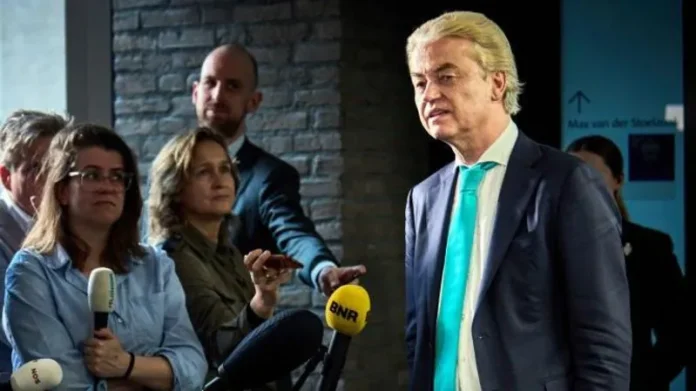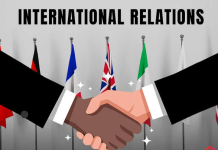Dutch Anti-Islam Leader Geert Wilders Reaches Coalition Agreement
Background
Nearly six months after Geert Wilders, the leader of the Dutch anti-Islam populist party, won the Dutch election, he has managed to reach a provisional agreement with three other party leaders to form a right-wing government. This significant political development follows Wilders’ surprising victory last November, which sent shockwaves through European politics.
The Agreement
Geert Wilders’ party, the Freedom Party (PVV), has reached a tentative coalition agreement with three other parties:
- Conservative-liberal VVD
- Centrist New Social Contract
- Farmer Citizens Movement (BBB)
Wilders announced the agreement, stating that it would now be presented to their parliamentary factions for approval. If they agree, these four parties will form the new Dutch government.
Wilders’ Concessions
In order to secure this coalition agreement, Wilders had to put some of his more extreme policies on hold. His original agenda included controversial measures like banning the Quran, Islamic schools, and mosques. These proposals have been set aside to facilitate the coalition talks and reach an agreement.
Leadership Decisions
A final decision on who will become the next Dutch prime minister has not been made yet, but it has been confirmed that it will not be Geert Wilders. Wilders stepped back from the prime ministerial race to help secure the coalition deal. The current favorite for the position is Ronald Plasterk, a 67-year-old former Labour party minister. Plasterk transitioned from a successful career in molecular biology to politics and is now being considered for the top job.
Coalition Challenges
The process of forming this right-wing coalition has been challenging. Initially, the four-party talks to form a government collapsed in February. By March, Wilders had abandoned his bid to become prime minister, allowing the negotiations to proceed without him as a candidate for the top position.
The Negotiation Process
The agreement was reached just hours before the latest deadline set by the current coalition negotiators. Wilders mentioned that while they have an agreement, adjustments could still be made before it is finalized. The Dutch parliament will debate the terms of the agreement in the coming week.
VVD’s Position
Dilan Yesilgöz, the leader of the conservative-liberal VVD, explained the delay in reaching an agreement by emphasizing the importance of setting a solid framework for the next government. The VVD had a poor performance in the last election, coming in third and losing ten seats in parliament.
Policy Expectations
Although few details about the coalition’s plans have emerged, it is expected that the new government will adopt hardline policies on asylum and immigration. Political correspondents suggest that there will be particularly strong measures concerning migrant workers, although the government intends to continue respecting international agreements. Additionally, significant investments are expected in areas such as social security, housing, defense, and agriculture.
Unconventional Cabinet
One unusual aspect of this new government is that the four party leaders are not expected to be part of the new cabinet. Instead, they will remain in parliament. The so-called extra-parliamentary cabinet will likely be made up of ministers who are not members of parliament. These ministers will have to adhere to the main terms of the coalition agreement.
Reaction from Coalition Partners
Caroline van der Plas, the head of the Farmer Citizen Movement, expressed satisfaction with the coalition deal, stating that it was “very nice for the Netherlands” that they had managed to reach an agreement.
Implications for Dutch Politics
The formation of this right-wing government marks a significant shift in Dutch politics. The coalition led by Wilders’ PVV, alongside the VVD, New Social Contract, and BBB, represents a move towards more conservative and hardline policies, particularly on issues related to immigration and asylum. This change comes after 14 years of broad-based coalitions led by VVD Prime Minister Mark Rutte, who has been serving as caretaker prime minister since the last election.
Broader European Context
Wilders’ victory and the formation of this right-wing coalition have implications beyond the Netherlands. It reflects a broader trend of populist and right-wing parties gaining traction across Europe. Wilders’ success and the subsequent coalition agreement highlight the growing influence of anti-Islam and anti-immigration sentiments within European politics.
Future Challenges
The new government will face several challenges as it takes office. Implementing hardline policies on immigration and asylum while maintaining international commitments will be a delicate balancing act. Additionally, significant investments in social security, housing, defense, and agriculture will require careful planning and execution.
The success of this coalition will depend on the ability of the new government to navigate these challenges effectively. The Dutch public and the international community will be watching closely to see how this new political landscape unfolds in the Netherlands.
Conclusion
Geert Wilders’ provisional agreement to form a right-wing government marks a significant development in Dutch politics. By putting some of his more extreme policies on hold, Wilders has managed to secure a coalition with three other parties. The final decision on the next Dutch prime minister is yet to be made, but the agreement represents a shift towards more conservative and hardline policies in the Netherlands. As the new government takes shape, it will face numerous challenges, but it also has the opportunity to address key issues and shape the future of Dutch politics.























